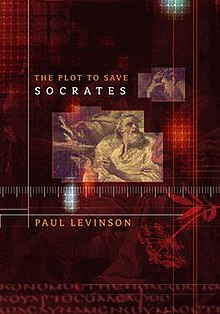The Plot to Save Socrates is a time travel novel by Paul Levinson, first published in 2006. Starting in the near future, the novel also has scenes set in the ancient world and Victorian New York.
 | |
| Author | Paul Levinson |
|---|---|
| Language | English |
| Genre | Philosophical Science Fiction |
| Publisher | Tor Books, New York City |
Publication date | Feb 2006/Feb 2007 |
| Publication place | United States |
| Pages | 266 |
| ISBN | 0-7653-0570-4 (hardcover); ISBN 0-7653-1197-6 (trade paper) |
| OCLC | 61879799 |
| 813/.54 22 | |
| LC Class | PS3562.E92165 P58 2006 |
Summary
editThe Plot to Save Socrates deals primarily with the concept of time travel, and while the novel rarely discusses time travel directly, it poses several questions about its validity and possibility (or lack thereof). In particular, the characters are trapped in endless time loops, effectively deprived of free will and having no choice but to take an action which - due to time travel - they already know they have taken.
The story begins in Athens, Greece in 2042 with the main character, Sierra Waters, thinking to herself, at which point the rest of the story begins as a flashback (both in her head and in the sense that the characters constantly flash in and out of historic eras).
Sierra Waters, a graduate student, receives a copy of a previously unknown dialogue in which Socrates is being offered an escape from his death sentence in ancient Athens by a person named Andros offering to take him into the future and leave a clone behind.
The document appears to be genuine, and this takes Sierra onto a path that leads her to a time traveling adventure of her own. On her path she meets up with the great historic inventor Heron of Alexandria but soon realizes that not only is Heron a time traveler himself (from a future later than hers) but is a suspicious and ruthless character. Later on she would encounter the renowned Athenian general Alcibiades, help save his life at the time when history records his death in 404 BC, become his lover and fall deeply in love with him, and help set him on a very extensive and fruitful later long life which would remain unknown to historians.
Together with various fictional characters, the story also involves Plato, and of course Socrates - who only comes onstage in the last part - as well as the 19th Century publisher William Henry Appleton. There are scenes across time, placed in the Ancient Library of Alexandria, Victorian New York City, and Roman London.
At various points it is mentioned that Sierra Waters would eventually become the famous mathematician Hypatia of Alexandria. This theme is taken up in a sequel, Unburning Alexandria, of which the first two chapters were published as a standalone novelette in the November 2008 issue of Analog Science Fiction and Fact.[1][2] The full-length novel was published as a trade paperback and ebook in 2013,[3] followed by the next novel in the series, Chronica, in December 2014.[4][5]
Reception
editPublishers Weekly found it "light (and) engaging", but warned that because of the constant use of time travel, "the plot threatens to fracture".[6]
In Strange Horizons, Colin Harvey praised it as "delightfully old-fashioned", with a "cool, spare style" which he compared to that of Isaac Asimov; Harvey did, however, consider that the first half of the novel was "almost too bloodless", and overall noted its excessive infodumping, and characters who "accept the idea of time travel a little too readily" and show "too little fear".[7] SF Signal lauded the intricate plotting (wishing for "a time-map of the leap-frogging made by the [characters], just to [see] its carefully crafted structure"), but observed that this came at the cost of characterization, emphasizing that Heron's motivation seems unclear and contradictory, and that Sierra's relationship with Alcibiades "somehow seemed unjustified".[8]
Publication history
editThe Plot to Save Socrates was edited by David G. Hartwell and published by Tor Books. The first edition appeared in February 2006, and went into its third printing in August 2006. A trade paperback edition was released on February 20, 2007; an ebook "author's cut" with an extended ending was released on December 11, 2012.
See also
editReferences
edit- ^ Levinson, Paul (November 2008). "Unburning Alexandria". Analog Science Fiction and Fact. Dell Magazines. Archived from the original on 14 March 2013. Retrieved 26 March 2013.
- ^ Clark, Brian Charles (2006). "The Plot to Save Socrates -- book review". Curled Up With A Good Book. Retrieved 26 March 2013.
- ^ Curtis, Jim (July 19, 2013). "Interview with Paul Levinson, Author of Unburning Alexandria". The Morton Report. Retrieved 16 October 2013.
- ^ DeNardo, John (December 3, 2014). "Captivating Science Fiction, Fantasy and Horror Reads for December". Kirkus Reviews. Retrieved 5 July 2016.
- ^ Chronica - Paul Levinson. ISBN 978-1-56178-031-0. Retrieved 5 July 2016.
{{cite book}}:|work=ignored (help) - ^ The Plot to Save Socrates, reviewed at Publishers Weekly; published November 14, 2005; retrieved October 11, 2020
- ^ The Plot to Save Socrates by Paul Levinson, reviewed by Colin Harvey, at Strange Horizons; published July 31, 2006; retrieved October 11, 2020
- ^ The Plot to Save Socrates by Paul Levinson, by John DeNardo, at SF Signal; published February 20, 2007; retrieved October 11, 2020